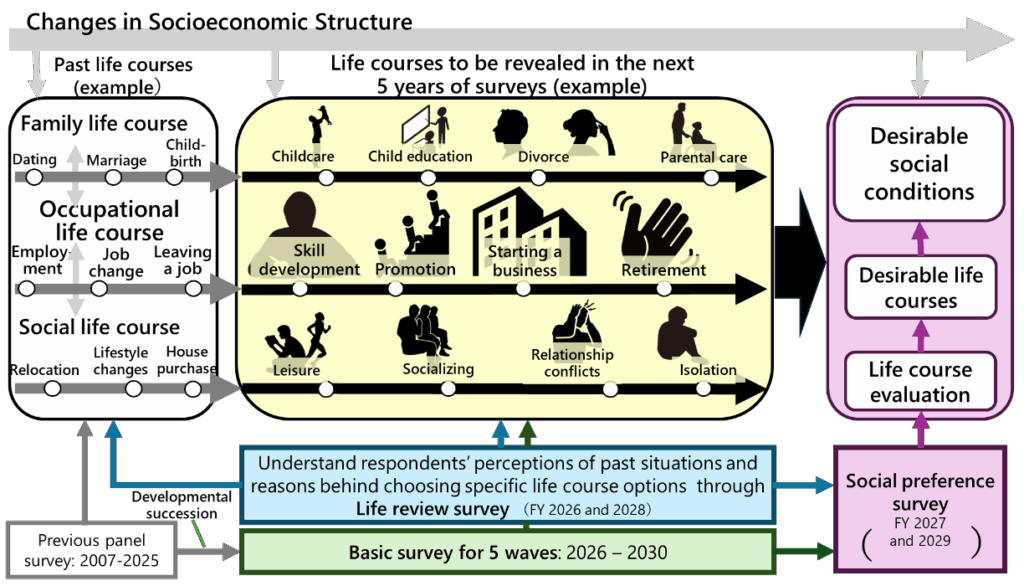Research
Analyzing Life Courses and Their Inequalities through Panel Surveys
Outline
This project investigates the life courses individuals follow in 21st-century Japan, focusing on the inequalities embedded within them and analyzing the causes and consequences of these disparities. To achieve this objective, we will convert the Japanese Life Course Panel Surveys for the Youth and Middle-aged Groups (JLPS-YM) to an online format, tailoring questions to respondents based on their previous responses and employing experimental methods (Fig. 1).
By doing so, we aim to provide a comprehensive and accurate explanation of people’s life courses and the disparities within them, considering both changes in socioeconomic structures and individual choices. Based on our findings, we will also derive policy implications to address the challenges facing Japanese society.

Background: Diversification of Life Courses
In today’s Japan, the standard pattern of life courses has been significantly disrupted due to changes in the labor market structure, such as the weakening of traditional Japanese employment practices, as well as various transformations in family structure.
As a result, a significant gap has emerged between those who continue to enjoy stable employment and career continuity and those who do not, resulting in disparities in family formation and social life. However, few studies have examined such changes and disparities in life courses over a sufficiently long time span, and even fewer have investigated their causes and consequences.
Purpose
This study addresses the following three questions by converting the paper-based panel survey (JLPS-YM) into a web-based format with questions designed to meet research objectives.
- What kinds of life courses are people following in terms of occupational, family, and social life amid changing socioeconomic structures, and what kinds of disparities have emerged among them?
- What kinds of situational perceptions, judgments, and choices contribute to disparities in people’s life courses?
- What kinds of life courses and social conditions do people consider desirable after reflecting on their own life courses?
This study also contributes to the public good for social science research and education on Japanese society by extending the large-scale panel survey, which has been conducted for nearly 20 years, for an additional five years, and by making the data publicly available at an early stage.
Survey Plan: Three Web-based Surveys and an Online Interview Survey
The following three web surveys will be conducted as part of this research.
- Basic Survey (every fiscal year): This survey continues from the previous panel survey (JLPS-YM) and has been transitioned to a web-based format. It aims to capture respondents’ current life courses in a detailed manner.
- Life review survey (FY2026 and FY2028): This survey is customized to respondents’ occupational, family, and social life course patterns. It will investigate their perceptions of past situations, the decisions they made, and the reasons behind their choices regarding life course options to date.
- Social Preference Survey (FY2027 and 2029): Using experimental methods such as conjoint surveys, this survey will explore respondents’ preferences for desirable life courses and the social conditions that support them. It will also explore how they evaluate their own life course.
Additionally, an online interview survey will be conducted with selected respondents who have agreed to participate, supplementing the above surveys.
Main Research Topics
(1) Identification of Life Course Patterns and Elucidation of Disparities
Utilizing multi-channel sequence analysis and group-based trajectory modeling, we will identify respondents’ life course patterns and analyze the socioeconomic disparities among them, considering the interrelationships among occupational, family, and social life courses. We will also investigate the impact of the weakening of traditional Japanese employment practices on workers’ occupational careers.
(2) Analysis of Factors and Consequences of Life Courses and Their Disparities
We will examine the respondents’ situational perceptions and decisions made at key turning points (e.g., job changes, unemployment, and marriage) within each life course pattern. By doing so, we aim to provide a comprehensive and accurate explanation of people’s life courses and the disparities among them. Furthermore, we will explore how individuals’ life courses shape their evaluation of their life courses and preferences for desirable social conditions.
A Study on the Transition of Panel Surveys to Web-Based Mode
This project examines, from the perspective of social survey methodology, what becomes possible by transitioning paper-based panel surveys to a web-based mode, what challenges arise in the process, and how those challenges can be addressed through the implementation of our own panel surveys.
A Comparative Study of Reward Inequality, Skills, and Job Tasks
This project analyzes, from an international comparative perspective, why and how reward inequalities emerge over the course of people’s lives, and how differences in individuals’ skills and job tasks are involved in these processes. It builds on the prior project, “A Comparative Sociological Study on the Acceptance and Justification of Reward Inequality through International Surveys” (JSPS Grant-in-Aid for Scientific Research (A), Project No. 20H00084, FY2020-2024).


